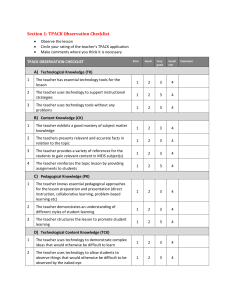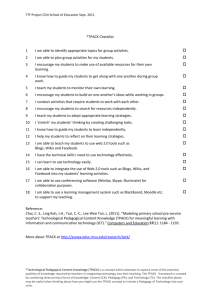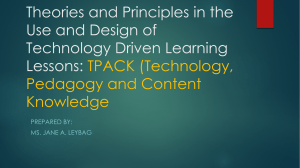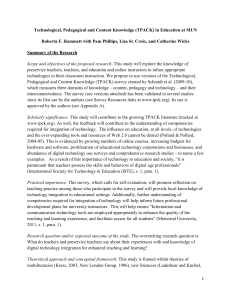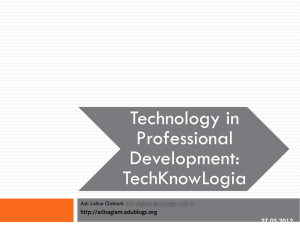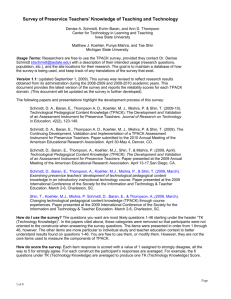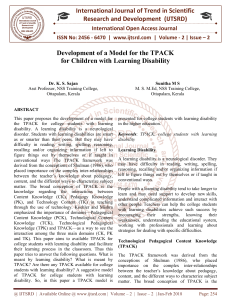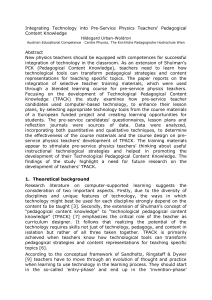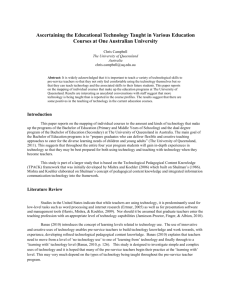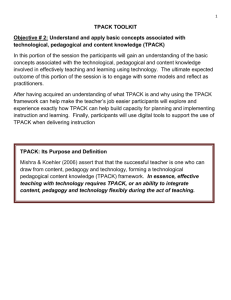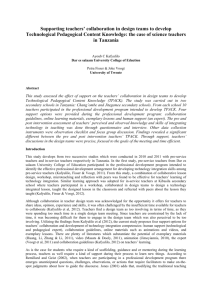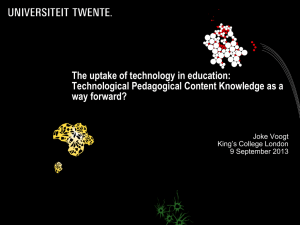Got TPACK? - Educational Technology Clearinghouse
advertisement
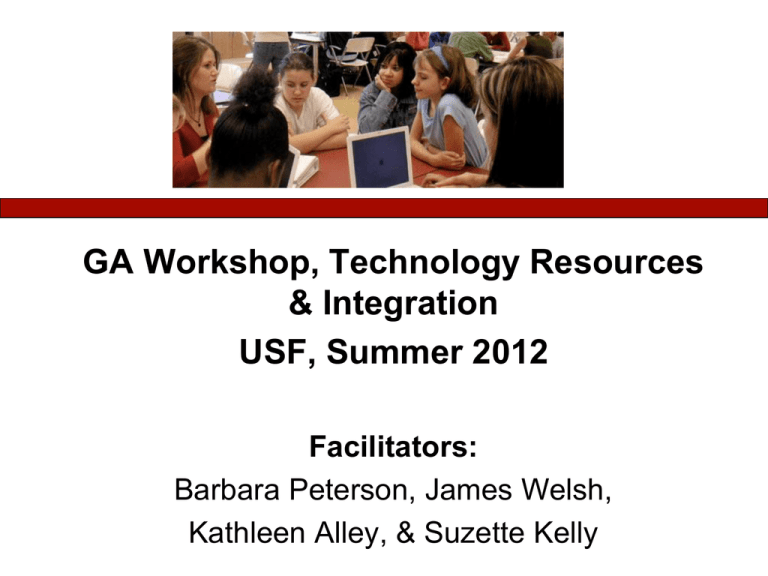
GA Workshop, Technology Resources & Integration USF, Summer 2012 Facilitators: Barbara Peterson, James Welsh, Kathleen Alley, & Suzette Kelly Technology – Fist to Five How would you rate your technology comfort level for the follow uses? • Personal applications • Teaching K-12 students • Teaching preservice teachers Agenda • • • • Technology Resources TPACK Model TIM Model Sharing GA experiences with technology integration • Question and answer Technology Resources • iTeach Lounge • Information Technology • COEDU Tech Resources Directory TPACK Model What knowledge is of most worth (when designing instruction)? Herbert Spencer, Social Theorist, 1859 • 2006: In the midst of fast-paced technological changes, the knowledge of most worth is TPACK… an ability to flexibly draw from and integrate Knowledge of Technology, Pedagogy, And Content (and their relationship to each other) into your curriculum and instructional practices Mishra & Koehler (2006) New times + new literacies = new mindsets • New times (de Argaez, 2006; Pew Internet & American Life Project, 2000-2009) • New literacies (Leu, Kinzer, Coiro, & Cammack, 2004; Spires, 2008) • New mindsets (Lankshear & Knobel, 2007) 1. Same as always - now things are just “technologized” 2. The world is fundamentally different - with new ways of doing things and new ways of being that are enabled by new technologies Why TPACK? • Learning how to use technology is much different than knowing what to do with it for instructional purposes (e.g., Smartboard; Ning) • Designing (or redesigning) instruction requires an understanding of how knowledge about content, pedagogy, and technology overlap to inform your choices for curriculum and instruction What is TPACK? http://tpack.org/ Mishra & Koehler (2006) TPACK Model Pedagogical Knowledge Content Knowledge Knowledge about the subject matter being taught; including facts, concepts, theories and procedures, plus the nature of inquiry in a given field. Technology Content Knowledge Knowledge about how technology and content are reciprocally related. Deep knowledge about the processes, practices and methods of teaching. Plus understanding that teaching may change with the use of new technologies. Technology Pedagogical Content Knowledge The thoughtful interweaving of all three key sources of knowledge: Technology, Pedagogy, and Content. Pedagogical Content Knowledge Technology Knowledge Knowledge of basic and advanced technology skills, plus the ability to adapt new technologies. Technological Pedagogical Knowledge Knowledge of the components and capabilities of various technology used in teaching, Knowledge of pedagogy that is applicable to the teaching of specific content. Interactions of TPACK , as described by Mishra & Koehler (2006), in Robin (2008). The Question of the week… How can you best use new technologies associated with your content objectives to promote student learning? Throughout the week (and back in your classroom) Consider how your pedagogical approaches might be framed to effectively integrate technology into contentarea instruction? What new knowledge/skills might you need? TPACK Guidelines • Content focus: What content does this lesson focus on? • Pedagogical focus: What pedagogical practices are employed in this lesson? • Technology used: What technologies are used? • PCK: Do these pedagogical practices make concepts clearer and/or foster deeper learning? • TCK: Does the use of technology help represent the content in diverse ways or maximize opportunities to transform the content in ways that make sense to the learner? • TPK: Do the pedagogical practices maximize the use of existing technologies for teaching and evaluating learning? • TPCK:How might things need to change if one aspect of the lesson were to be different or not available? TIM Model mytechmatrix.org Technology Integration Matrix (TIM) mytechmatrix.org Sharing GA Experiences With Technology Integration James Welsh • Poetry Slam via Skype – 6th Grade students during culminating unit on poetry performing for preservice teachers – Preservice teachers responding via poetry one week later – Private Q & A session with teacher Suzette Kelly - Kathleen Alley • • Student 1 – https://sites.google.com/site/ebooksineducation/home E-books in Education: both teacher and parent module can be found there • • Student 2 – “Countdown to Kindergarten!” http://rebeccahaley.edu.glogster.com/coaching-modules-summer-2012/ • Student 3 –This Coaching Unit will explore information about word learning and word family instruction, the research behind it, and best instructional strategies including technology components. http://red6449sarahhopkinscoachingunit.pbworks.com/w/page/55450798/Coaching%20Unit-%20Word%20Learning • • • • • • • • • • Student 4 – Teachers will be exposed to the research of reading, what new media literacies are, and how to use a few of them in their classroom. Parents will be exposed to the benefits of using new media literacies in the classroom and see how teachers are using these new literacies in the classroom. Teacher Unit: http://www.livebinders.com/play/play_or_edit?id=441764 Parent Unit: http://www.livebinders.com/play/play_or_edit?id=442298 Student 5 – I created two modules, one for educators and one for students, about how to incorporate Second Life into the classroom. The modules review what Second Life is, how to use it, the research as to why it's being used in education, and assignments students and instructors can participate in. Educators:http://www.livebinders.com/edit/index/444037 Students: http://www.livebinders.com/edit/index/448496 Barbara Peterson TPACK Reflection Points •Enacting TPACK as a GA – it’s a journey! •Varying levels of PSTeachers’ technological access, competencies, and predisposition •Time constraints – allow time for play •Shifting from consumer to creator of media •Developing critical media literacy skills •Developing assessment tools to evaluate TPACK processes and products Questions and Answers References • Mishra, P., & Koehler, M. J. (2006). Technological pedagogical content knowledge: A new framework for teacher knowledge. Teachers College Record, 108(6), 1017-1054. • Koehler, M. J. Technological Pedagogical Content Knowledge. www.TPACK.org
